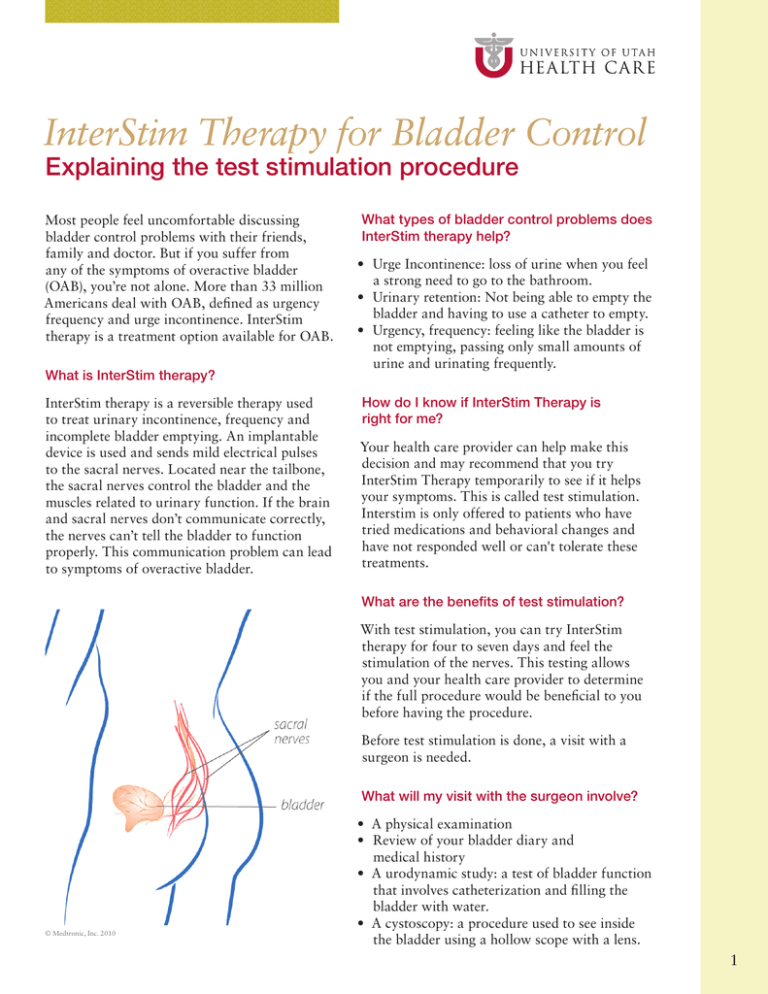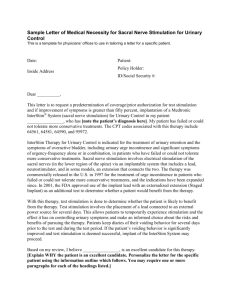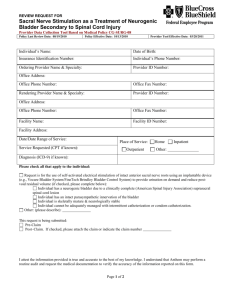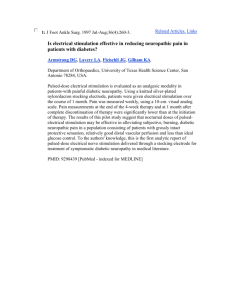InterStim Therapy for Bladder Control
advertisement

InterStim Therapy for Bladder Control Explaining the test stimulation procedure Most people feel uncomfortable discussing bladder control problems with their friends, family and doctor. But if you suffer from any of the symptoms of overactive bladder (OAB), you’re not alone. More than 33 million Americans deal with OAB, defined as urgency frequency and urge incontinence. InterStim therapy is a treatment option available for OAB. What is InterStim therapy? InterStim therapy is a reversible therapy used to treat urinary incontinence, frequency and incomplete bladder emptying. An implantable device is used and sends mild electrical pulses to the sacral nerves. Located near the tailbone, the sacral nerves control the bladder and the muscles related to urinary function. If the brain and sacral nerves don’t communicate correctly, the nerves can’t tell the bladder to function properly. This communication problem can lead to symptoms of overactive bladder. What types of bladder control problems does InterStim therapy help? r Urge Incontinence: loss of urine when you feel a strong need to go to the bathroom. r Urinary retention: Not being able to empty the bladder and having to use a catheter to empty. r Urgency, frequency: feeling like the bladder is not emptying, passing only small amounts of urine and urinating frequently. How do I know if InterStim Therapy is right for me? Your health care provider can help make this decision and may recommend that you try InterStim Therapy temporarily to see if it helps your symptoms. This is called test stimulation. Interstim is only offered to patients who have tried medications and behavioral changes and have not responded well or can't tolerate these treatments. What are the benefits of test stimulation? With test stimulation, you can try InterStim therapy for four to seven days and feel the stimulation of the nerves. This testing allows you and your health care provider to determine if the full procedure would be beneficial to you before having the procedure. Before test stimulation is done, a visit with a surgeon is needed. What will my visit with the surgeon involve? © Medtronic, Inc. 2010 r A physical examination r Review of your bladder diary and medical history r A urodynamic study: a test of bladder function that involves catheterization and filling the bladder with water. r A cystoscopy: a procedure used to see inside the bladder using a hollow scope with a lens. 1 How is the test stimulation procedure done? Once in the operating room, you will be given medication to help you relax. The surgeon will numb the area around your sacrum (tailbone). While lying on your stomach, a needle will be inserted and guide the wires into the correct place. To ensure the wires are placed correctly, you will be asked where you are feeling the stimulation and special x-rays will be taken. You will feel a vibrating sensation in the vaginal or rectal area. Once the correct sensation is achieved, the wires will be secured and a test stimulator will be connected to the wires. The test stimulator is worn on your clothing by clipping it to your waistband. After the procedure, antibiotics and pain medication may be prescribed. Are there risks with the procedure? The risks are minimal and include: r Bleeding r Infection r Transient electrical shocks r Continued bladder problems r Pain Are other treatment options available? Alternative treatment options include: r r r r Behavioral techniques. Managing your fluid intake. Reducing bladder irritants. Learning to suppress the urge with special techniques using your pelvic floor muscles. r Medications. r Self-catheterization (for retention). How do I use the stimulator? You are able to control the amount of stimulation you feel using the control knob on the stimulator. It is important you always feel the stimulation during the test period. You may increase or decrease the amplitude depending on how much sensation you feel in the vagina or rectal area. It should always be comfortable! The top of the test stimulator has two indicator lights. A green blinking light means the unit is on. A yellow light means the battery is low (replace with a © Medtronic, Inc. 2010 9 volt battery). If the stimulation stops, you may need to turn the device off and then on again, and slowly increase the amount of stimulation. If this does not help, the battery may need to be replaced. Are there special care instructions after my procedure? During the test week, it is important to avoid sexual and strenuous activity to ensure the wires stay in place. Keep the operative sites dry and be careful to not pull the wires. Should I continue with my diary during the test period? Yes. It is important to maintain your voiding diary during the test period. It will be compared to your diary before the procedure to check progress. This diary is also important to the insurance company and used to make decisions about payment and determining if this is the best therapy for you. What follow up is involved with this treatment? The nurse will call you three-four days after the procedure to discuss your response to InterStim treatment. If after the test period it is decided that you will move forward with a permanent stimulator, this procedure will be scheduled within a week. After the permanent stimulator is placed, you will have a two-week follow up appointment. Please bring your pre and post diary to this visit so we can place them in your chart. 2 Who do I contact with questions after the procedure? Please feel free to contact us with any questions you have. A nurse is available during the day between 8 a.m.–5 p.m.: (801) 581-3565 After hours: The on-call Urology resident is available. Please call (801) 581-2121 and ask for the on-call Urology resident. Where can I learn more about the Medtronic InsterStim Device? We are available to answer any questions you may have. You may also learn more at www.medtronic.com or call 1-800-328-0810. Frequently Asked Questions about the Permanent InterStim Device Can I adjust the level of stimulation? Your hand held battery operated device sends signals to your neurostimulator and can adjust the amplitude of stimulation. For additional information, you can contact us or refer to the patient packet manual packaged with the programmer. The neurostimulator battery cannot be recharged but will need to be replaced when it no longer works. Batteries typically lasts five to seven years. What is normal stimulation? What are the components of the InterStim Device? Unlike the test stimulation period, the stimulation from the implanted device is not constant and is often inconsistent. Below are some guidelines on what to expect: Implanted Parts Neurostimulator: (pacemaker) send mild electrical pulses through the lead. r You can remove the bandages and shower three days after surgery. r Gradually increase your activity level as your incisions heal and you feel you are able. r The device has been programmed and turned on. r You should feel a slight tingling sensation in the vaginal area (women) or scrotal area (men) r Intensity may increase or decrease with your position. © Medtronic, Inc. 2010 Lead: a thin wire that carries the pulses to stimulate the selected nerve in the lower back. r You may not feel stimulation at all times. r If your bladder control is similar to what it was during the test stimulation period, do not turn up the amplitude. This will only cause pain and decrease the generator’s battery life. External Controller r If the stimulation is uncomfortable, decrease the amplitude with your programmer. If it continues, turn the stimulator off. Wireless hand held device: adjusts the strength of stimulation and allows you to turn the device on and off. In what scenarios should I come in for an appointment or contact my provider? © Medtronic, Inc. 2010 What should I expect after my InterStim device has been implanted? r Even with pain medication, it is normal for the incisions to hurt for the first two weeks after surgery. r If you are involved in an accident or suffer a fall. r If the device seems less effective at controlling your bladder. Please bring the hand-held device. 3 r Medication may still be needed to fully control leaking. You should continue with bladder training and fluid management but if you would like medication, contact us. r General follow up appointments should be made two weeks after the permanent device is implanted, then every three months the first year and every six months the second year, and yearly after that. r We are happy to answer any questions you have about your InterStim device. What precautions should I be aware of? Because of your device, there are certain procedures you cannot have. For your safety, always tell your doctor or medical staff about your InterStim device before undergoing any tests or surgery. Procedures you CANNOT have: Diathermy: short wave, microwave or ultrasound diathermy. This therapy produces energy that can be transferred through your implant and cause tissue damage and result in severe injury and death. At the airport, show your InterStim ID card and ask those in charge to bypass the walk through screener. Do I need to carry the hand held device with me? You do not need to carry the hand held device with you at all times, but it should be available to you when you need to make adjustments to the stimulation the device is sending. Is there anything I can do to protect the hand held device? Take care of your hand-held device. It costs about $1200 to replace it. If applicable, we advise you add it to your home owner’s insurance policy. Questions/Notes __________________________________________ __________________________________________ __________________________________________ MRI (Magnetic Resonance Imaging) __________________________________________ This therapy may result in failure dislodgement, heating or induced voltages in the neurostimulator and/or lead. __________________________________________ What about other radiology procedures? Turn off your neurostimulator if you are having an ultrasound, CT scan, electrical stimulation, or any other radiology test, procedure or surgery. Please be aware that even if your stimulator is turned off, you may still receive sudden yet brief shocks or jolts from strong electrical devices or magnets. What about airport security? You will be sent a permanent ID card for your implantable device from Medtronics, the company who makes the device. You should carry this card with you at all times in case of medical emergency and for use while traveling. __________________________________________ __________________________________________ __________________________________________ __________________________________________ __________________________________________ __________________________________________ __________________________________________ __________________________________________ __________________________________________ 4





